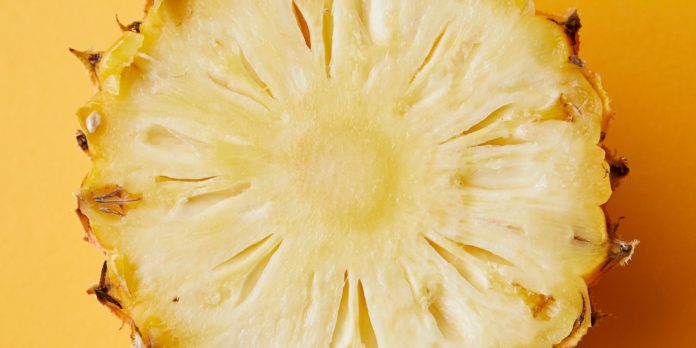When you’re pregnant, family, strangers, and friends who mean well will give you a lot of advice and thoughts. Some of the things you’re told are useful. Some of it may not be true.
For example, you may have heard that you’ll go into labor if you eat a whole pineapple.
If you are pregnant, you might wonder if the pineapple is safe to eat. Pineapple is full of important vitamins and fiber, so it seems like good food for pregnant women to eat. You might have heard that pineapple can strengthen your contractions and cause you to lose your baby.
Even though pineapple has an enzyme that makes pregnant women more likely to have a miscarriage, this enzyme is in very small amounts in the part of the pineapple we eat. Before you avoid this tasty and healthy fruit for the next 36 to 42 weeks, here are the facts.
I’m pregnant. Can I eat pineapple?
Pineapple is safe and healthy for pregnant women to eat. Someone may have told you to stay away from this fruit because it could make you miscarry or start labor early. But this is just a story.
There is no scientific evidence that taking pineapple while pregnant is dangerous. There is no evidence for the rumors about pineapple.
What of Bromelain?
Bromelain is an enzyme found in pineapple.
Tablets of bromelain shouldn’t be taken while you’re pregnant. They can readily break down proteins in the body, which can cause bleeding that isn’t normal.
Even though bromelain is in the core of the pineapple, there isn’t much of it in the part we eat, which is the flesh. The quantity of bromelain in one serving of pineapple probably won’t affect your pregnancy.
Can Pineapple Be a Healthy Part of a Diet for a Pregnant Woman?
The United States Department of Agriculture (USDA) says that the best diet for a pregnant woman is made up of foods from five groups:
- Fruits
- Vegetables
- Grains
- Dairy
- Beans, chicken, meat, eggs, fish, and eggs are all good protein sources.
Try to eat various healthy, nutrient-dense foods to feel your best. The minerals and vitamins your infant needs to grow and develop are in these food groups. Also, drink a lot of water.
How much you eat depends on your age, height, weight, and activity level.
 Take the case of a 30-year-old who is about averagely active and is 5 feet, 4 inches tall, and weighs 140 pounds.
Take the case of a 30-year-old who is about averagely active and is 5 feet, 4 inches tall, and weighs 140 pounds.
In your first trimester, you should eat about 4.5 cups of fruits and vegetables every day, according to the USDA’s MyPlate plan. You should eat 5 cups daily during the second and third trimesters.
Depending on how active she is, a 30-year-old woman who is 5 feet, 9 inches tall and expecting may need as many as 6.5 cups of fruits and vegetables daily.
What Amount of Pineapple Can I Eat While Pregnant?
One cup of pineapple can have almost all the recommended daily vitamin C for a pregnant woman.
It’s also a good way to get:
- Iron
- Magnesium
- Copper
- Manganese
- Vitamin B-6 (pyridoxine)
- Folate
All these nutrients are important for the growth and health of your baby and you.
If you would love to add pineapple to your diet during pregnancy but don’t know where to start, there are several ways to do so.
What Other Fruits and Vegetables Can I Eat?
What should you eat next? Go to your local grocery store’s vegetable and fruit section. There are so many different fruits and vegetables to try, and they change with the seasons.
Some smart choices could be:
- Spinach
- Apples
- Green beans
- Oranges
- Apricots
- Sweet Potatoes
- Mangoes
- Winter squash
If you’re in haste, you can also eat frozen, canned, or dried fruits and vegetables instead of junk food.
Does Eating Pineapple Pose Other Risks in Pregnancy?
Pineapple may not be dangerous and may not help you have your baby any faster, but eating a lot of it can make you feel sick. If you have a sensitive stomach, be careful.
Because pineapple is acidic, it may give you heartburn or acid reflux. To avoid these problems, it’s best to eat this tasty fruit in small amounts.
You should call your doctor if you don’t usually eat pineapple but feel sick after snacking on it.
Some signs of an allergy are:
- Your mouth is itchy or swollen
- Asthma
- Congestion or a nose that runs
- Skin changes
If you have an allergy, these things usually happen within minutes after you eat pineapple. If you are allergic to pollen or latex, you are more likely to be allergic to this fruit.
Pineapple Pregnancy Benefits
Pineapple has many good qualities that help a pregnant woman stay healthy.
Anti-inflammation Properties
Large amounts of bromelain can cause a miscarriage, but the small amount of this digestive enzyme found in pineapples is good for you. For example, it can help reduce inflammation.
This is good for your health, but it can be especially helpful when pregnant. When you are pregnant and have inflammation, your baby is more likely to have mental health or brain development problems. Also, inflammation can worsen pregnancy pains, so getting rid of it will help you feel better.
Fiber
Pineapple has a lot of fiber, too. This helps with constipation, which is a common problem during pregnancy.
Keeps You Hydrated
During pregnancy, it’s important not to get too thirsty, and pineapple is 87% water. It may be easier to drink than extra glasses of plain water because of its sweet taste (though it is still important to drink plenty of fluids).
Vitamin B6
There is a whole lot of vitamin B6 in pineapple. This important vitamin is important for the development of the brain. Also, pregnant people often don’t get enough vitamin B6, so it’s important to take vitamin supplements and eat foods that have them.
Vitamin B6 can also help with morning sickness-related nausea.
Vitamin C
Pineapple is full of vitamin C, which helps keep your immune system in good shape. One cup of pineapple contains the amount of vitamin C that pregnant women need daily.
Allergies to Pineapple
It is possible to be allergic to pineapple. Food allergies can happen at any age, though they are less common in adults. If you eat pineapple and feel like your tongue is burning or sore, or if your lips, tongue, or throat are itchy or swollen, or if you have any other strange symptoms, you should return to the doctor immediately.
If you have anaphylaxis symptoms like wheezing, coughing, vomiting, diarrhea, or low blood pressure, call an emergency number and talk to a doctor about whether you should eat pineapple in the future or stay away from it.
Heartburn
Pineapple is acidic, so it may give you heartburn. Heartburn is one of the most common complaints during pregnancy, and it gets worse as the pregnancy goes on.
If you overeat pineapple, you might get acid reflux or heartburn, so don’t eat too much. If you love pineapple but get heartburn when you eat it, try eating it with toast, cereal, or brown rice.
If you have heartburn, you should stay upright after eating, try eating smaller meals more often than the usual three big meals a day, and drink fluids between meals instead of with them.
Strangely enough, pineapple can sometimes help with heartburn. This is because bromelain can also help reduce inflammation.
Gestational Diabetes
Pineapple does have sugars that come from nature. As long as you eat this fruit right away and don’t eat too much of it, the sugar shouldn’t be a problem.
You could get gestational diabetes if you eat a lot of fruit or other sugary foods or if your pineapple comes in a can or is juiced. This is significantly true if you have a higher risk of getting gestational diabetes already.
Safety Precautions
 Pineapple is usually safe, but there are a few things to watch out for when you’re pregnant.
Pineapple is usually safe, but there are a few things to watch out for when you’re pregnant.
Conclusion
You probably won’t have a miscarriage or go into labor faster if you eat pineapple while you’re pregnant. You can eat normal amounts of fresh pineapple, pineapple in a can, or pineapple juice without getting sick.
If you are still worried about adding this fruit to your diet, talk to your doctor about your worries and ask for more information about foods that are safe for pregnant women to eat.




